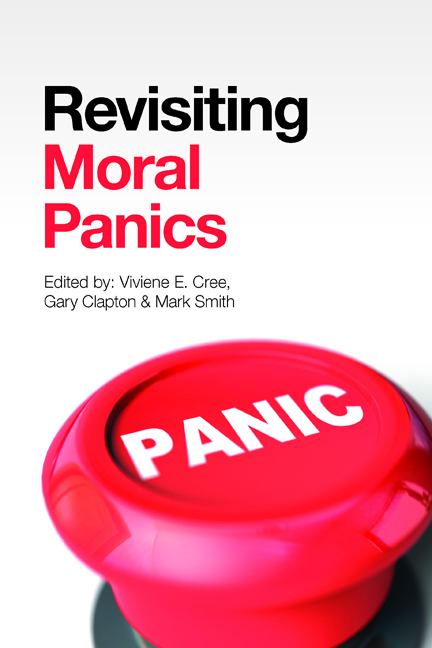Book contents
- Frontmatter
- Contents
- Contributors
- Preface
- Commentary moral panics yesterday, today and tomorrow
- Part One Gender and the family
- Part Two Moral panics in our time? Childhood and youth
- Part Three The state, government and citizens
- Part Four Moral crusades, moral regulation and morality
- Afterword the moral in moral panics
- Conclusion Moral panics and beyond
- Index
Two - Myths, monsters and legends: negotiating an acceptable working class femininity in a marginalised and demonised Welsh locale
Published online by Cambridge University Press: 08 March 2022
- Frontmatter
- Contents
- Contributors
- Preface
- Commentary moral panics yesterday, today and tomorrow
- Part One Gender and the family
- Part Two Moral panics in our time? Childhood and youth
- Part Three The state, government and citizens
- Part Four Moral crusades, moral regulation and morality
- Afterword the moral in moral panics
- Conclusion Moral panics and beyond
- Index
Summary
Introduction
The distinctiveness of Wales in terms of its political life and culture has grown considerably since the early 2000s (Mackay, 2010). Nevertheless, beneath the imagery of the definitive nation, Wales remains a complex and divided land in which a marginalised and demonised working class has come to characterise areas of Wales dominated by poverty and social exclusion. Such polarisation has a spatial dimension that is illustrated in the creation of new ghettos of prosperity and poverty that now dominate the Welsh socioeconomic terrain, and this ‘stigma of place’ permeates the identities of residents. The chapter begins by considering how moral panics about particular places create ‘spatial folk devils’. The creation of moral panics through political discourses and mediated forms is then explored in terms of contemporary representations. Drawing on research with mothers and their daughters in a marginalised Welsh locale, the chapter examines the ideology of unity alongside the divisions of everyday life, and the ways in which respectable and acceptable working-class femininities are negotiated against a pervasive discourse of lack, stigma and classed moral panics.
Moral panics and folk devils: contemporary Representations
As Cohen (1980, p 9) contends, societies are subject to periods of moral panic in which ‘a condition, episode, person or group of persons emerges to become defined as a threat to societal values’. Moral panics are often discussed in relation to group criminality, incivility and disorder. However, arguably, the emphasis on collective behaviour has shifted to that of the morality of deficient individuals who require discipline; and these deficiencies are seen as a product of personal choice, where individuals are authors of their own immorality (Burney, 2005). Moral panics are often associated with the sociology of deviance, focusing on ‘delinquency, youth cultures, subcultures and style, vandalism, drugs and football hooliganism’ (Cohen, 2011, p vi). Nevertheless, the concept of morality also relates to wider discourses about appropriate ways of being that move beyond criminal behaviour and acts of resistance, to encompass socially constructed ideologies that form part of the invisible social order.
The nineteenth century was characterised by moral panics about the ignorance, ineptness and filthiness of working-class women (Delamont, 1978; Aaron et al, 1994; Beddoe, 2000) who were ‘defined as a threat to societal values’ (Cohen, 1980, p 9).
- Type
- Chapter
- Information
- Revisiting Moral Panics , pp. 19 - 28Publisher: Bristol University PressPrint publication year: 2015



